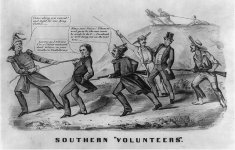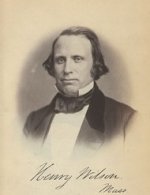jazzeum
Four Star General
- Joined
- Apr 23, 2005
- Messages
- 38,439
April 16, 1862 was a significant day in U.S. history and the conduct of the Civil War for two reasons.
On April 16, 1862, the Confederate Conscription Act was adopted by the Confederate Congress. This was the first draft in United States history and made all white males between the ages of eighteen and thirty-five eligible to be drafted into military service.
This was not a popular move as evidenced by the following images:

Southern Volunteers
![Conscript_poster-538x369[1].jpg Conscript_poster-538x369[1].jpg](https://forum.treefrogtreasures.com/data/attachments/70/70586-8a75bb4988b60248d2923d8884d76c79.jpg)
Anti-Conscription Poster
The public considered it an infringement on individual free will and personal liberty and feared it would concentrate arbitrary power in the military. Soldiers complained that it compromised voluntary enlistments and appeared as an act of desperation in the face of military defeats.
The other significant event that occurred on April 16, 1862 was the end of slavery in the nation’s capital: President Lincoln signed a bill passed by the U.S. Congress abolishing slavery in Washington, D.C.
During the Civil War, members of Congress from the abolitionist “Radical” wing of the Republican Party looked for ways legislatively to abolish slavery nationwide, despite the Dred Scott decision, but most members of Congress believed that slavery only could be ended legally by constitutional amendment.
When Congress convened in December 1861, the Radicals judged the time was ripe for slavery to be abolished in Washington, D.C. Senator Henry Wilson of Massachusetts, introduced a bill to do just that on December 4, 1861. From that date the bill worked its way through the congressional committee process receiving final passage in April 1862.

Senator Henry Wilson
The District of Columbia Emancipation Act, as it became known, compensated financially loyal slaveholders for their lost property and promoted the emigration of former slaves in Washington, D.C., by paying them $100 if they agreed to leave the United States.
It was the beginning of the end for American slavery.
Please see Freedom Comes to Washington in the April 16 edition of the Disunion blog of the New York Times.
On April 16, 1862, the Confederate Conscription Act was adopted by the Confederate Congress. This was the first draft in United States history and made all white males between the ages of eighteen and thirty-five eligible to be drafted into military service.
This was not a popular move as evidenced by the following images:

Southern Volunteers
![Conscript_poster-538x369[1].jpg Conscript_poster-538x369[1].jpg](https://forum.treefrogtreasures.com/data/attachments/70/70586-8a75bb4988b60248d2923d8884d76c79.jpg)
Anti-Conscription Poster
The public considered it an infringement on individual free will and personal liberty and feared it would concentrate arbitrary power in the military. Soldiers complained that it compromised voluntary enlistments and appeared as an act of desperation in the face of military defeats.
The other significant event that occurred on April 16, 1862 was the end of slavery in the nation’s capital: President Lincoln signed a bill passed by the U.S. Congress abolishing slavery in Washington, D.C.
During the Civil War, members of Congress from the abolitionist “Radical” wing of the Republican Party looked for ways legislatively to abolish slavery nationwide, despite the Dred Scott decision, but most members of Congress believed that slavery only could be ended legally by constitutional amendment.
When Congress convened in December 1861, the Radicals judged the time was ripe for slavery to be abolished in Washington, D.C. Senator Henry Wilson of Massachusetts, introduced a bill to do just that on December 4, 1861. From that date the bill worked its way through the congressional committee process receiving final passage in April 1862.

Senator Henry Wilson
The District of Columbia Emancipation Act, as it became known, compensated financially loyal slaveholders for their lost property and promoted the emigration of former slaves in Washington, D.C., by paying them $100 if they agreed to leave the United States.
It was the beginning of the end for American slavery.
Please see Freedom Comes to Washington in the April 16 edition of the Disunion blog of the New York Times.

